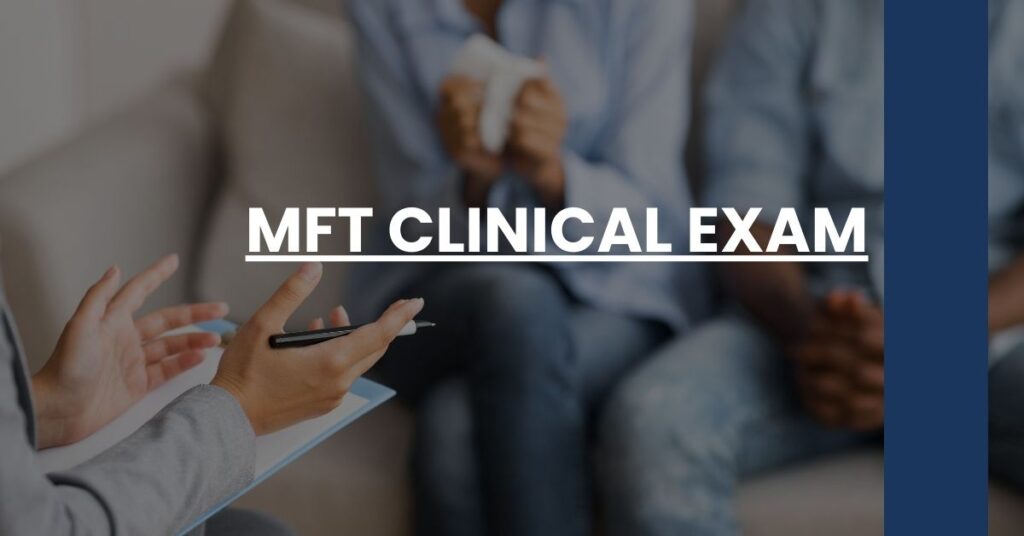Master the MFT Clinical Exam with precision-guide strategies and tips essential for your professional success.
- MFT Clinical Exam Overview: Get a clear understanding of the exam’s structure and what to expect.
- Key Preparation Tactics: Learn targeted study methods that lead to exam success.
- Exam Day Insights: Gain practical advice for navigating the test-taking experience smoothly.
Secure your career advancement by excelling in the MFT Clinical Exam.
- Understanding the MFT Clinical Exam
- Eligibility Criteria for MFT Clinical Exam
- Registration and Application Process
- Exam Format and Content Structure
- Effective Study Strategies and Resources
- Test-Taking Strategies for MFT Clinical Exam
- Accommodations and Accessibility
- Day of the Exam: What to Expect
- After the Exam: Scoring and Results
- Retaking the Exam: Processes and Preparation
- Licensure and Beyond: Next Steps After Passing the Exam
- FAQs: Addressing Common Concerns
- Conclusion: Your Pathway to Professional Growth
Understanding the MFT Clinical Exam
The Marriage and Family Therapy Clinical Examination (MFT Clinical Exam) represents a pivotal step in your journey toward becoming a licensed marriage and family therapist. This exam is the culmination of your hard work, where you demonstrate the depth of your knowledge, the breadth of your skills, and your readiness to help families navigate their challenging dynamics. The MFT Clinical Exam is not just a test of your memory; it is a test of your ability to think critically, ethically, and empathetically as a professional.
Purpose and Significance
The core purpose of the MFT Clinical Exam is to ensure that candidates have a thorough understanding of the practice of marriage and family therapy. As a rigorous assessment tool, the exam checks for:
- Professional Competence: Your ability to apply therapeutic practices effectively.
- Ethical Judgment: Your understanding of ethical practices and legal constraints.
- Clinical Evaluation Skills: Your capacity to assess, diagnose, and formulate treatment plans.
Passing this exam confirms your readiness to hold the title of a Licensed Marriage and Family Therapist, a professional who can make a profound difference in the lives of clients.
Areas Assessed
Your competencies will be vetted across various domains of knowledge, which include but are not limited to:
- Theoretical Knowledge: Your grasp of different therapy models and techniques.
- Clinical Application: Your proficiency in applying theory to practice.
- Crisis Management: Your skills in handling emergency situations effectively.
When you sit for the MFT Clinical Exam, you are stepping into a role that is vital for the well-being of individuals, couples, and families. Your success on this exam validates your preparedness to engage with the complexities of therapeutic practice.
Eligibility Criteria for MFT Clinical Exam
Before you dive into the intricacies of the MFT Clinical Exam, it’s crucial to navigate through the eligibility maze. Eligibility criteria are the stepping stones that lead you to the exam room. To sit for this vital exam, you’ll need to fulfill certain prerequisites that typically include:
- Educational Background: A master’s degree or higher in marriage and family therapy or a related field from an accredited institution.
- Supervised Experience: A designated number of hours of supervised clinical experience.
- Pre-licensure Coursework: Specific courses that prepare you legally and ethically for clinical practice.
Your diligence in meeting these requirements is your first victory on the road to becoming a licensed professional. The path may be stringent, but it’s paved to ensure that those who pass are truly ready for the responsibility that lies ahead.
Registration and Application Process
The journey to taking the MFT Clinical Exam starts with a methodical registration and application process. To ensure a smooth experience, you’ll want to:
- Submit Applications: Ensure all your licensure applications are correctly filled and sent to the relevant governing board.
- Watch for Approval: Be on the lookout for approval notifications that give you the green light to proceed.
Timelines and fees vary by state or governing body, so it’s essential that you confirm details specific to your jurisdiction. Consider consults with seasoned therapists or advisors—they often provide invaluable guidance that can streamline your application process.
Exam Format and Content Structure
When you are seated in the examination room, you’ll be faced with a specific set of challenges. The MFT Clinical Exam format is designed to test your critical thinking as much as your knowledge base. Here’s what you can expect:
- Multiple-Choice Questions: The bulk of the exam consists of scenarios followed by potential actions or rationales.
- Content Areas: You will be tested on diverse topics, from crisis management to long-term therapeutic interventions.
Understanding the nature and structure of the MFT Clinical Exam arms you with the strategic insight necessary to conquer it. Remember, the exam not only assesses your knowledge but also your ability to apply that knowledge in a clinical setting.
Effective Study Strategies and Resources
Preparing for the MFT Clinical Exam can be daunting, but with the right strategies and resources, you’ll find yourself poised for success. Here are some powerful tips to incorporate into your study plan:
- Start Early and Stay Consistent: Begin studying months in advance and keep a steady pace.
- Use Multiple Study Resources: Utilize study guides, flashcards, and practice tests to diversify your learning.
Incorporating an array of study materials caters to different learning styles and helps ensure a deep understanding of the subject matter. Your study strategy should be as multifaceted as the exam itself. Explore the Association of Marital & Family Therapy Regulatory Boards for an array of resources catering to your MFT Clinical Exam preparation.
Test-Taking Strategies for MFT Clinical Exam
When the day arrives and you’re faced with the MFT Clinical Exam, having a toolbox of test-taking strategies is crucial. Here’s how you can optimize your performance during the exam:
- Manage Your Time: Allocate a specific amount of time per question and stick to it.
- Answer Wisely: If a question stumps you, move on and return to it later with fresh eyes.
By approaching the MFT Clinical Exam with these strategies, you’re not just answering questions; you’re demonstrating a mastery of both the material and the art of test-taking. Remember, every question is an opportunity to showcase your readiness to be a licensed marriage and family therapist, a professional equipped to make a difference.
Accommodations and Accessibility
When it comes to ensuring that all candidates have a fair opportunity to showcase their expertise on the MFT Clinical Exam, special accommodations are in place. Understanding and accessing these provisions is essential for those with specific needs.
Applying for Special Accommodations
If you have a disability or another condition that could impact your exam performance, you may be eligible for accommodations such as extra time, breaks, or alternative formats. To request these accommodations:
- Review the Accommodation Guidelines: Familiarize yourself with the criteria and processes by visiting the governing board’s accommodation page.
- Submit Documentation: Provide comprehensive details from a qualified professional to support your request.
It is imperative that you apply for these accommodations well in advance. Each request is assessed carefully to ensure that the appropriate support is provided, allowing you to take the MFT Clinical Exam with the confidence that your individual needs have been considered.
Day of the Exam: What to Expect
The day you sit for the MFT Clinical Exam will be a climactic moment in your academic and professional journey. Having a clear understanding of what to expect can significantly ease your mind.
Exam Day Procedures
To set the stage for a successful test day:
- Planning Your Arrival: Aim to get to the testing center early—this helps alleviate any potential stress from rushing or unexpected delays.
- Identification Verification: Ensure you have the appropriate forms of ID as specified by the testing authority. Typically, a government-issued photo ID is required.
Understanding the dynamics of the exam day—from the strict adherence to testing protocols to the silence of the room—arms you with the foresight to navigate the experience calmly.
After the Exam: Scoring and Results
The MFT Clinical Exam is a standardized test, and as such, it follows a structured scoring process. Knowing how your performance is assessed and when you can expect results can help set your post-exam expectations accordingly.
Understanding Your Score
Scores on the MFT Clinical Exam are typically scaled, meaning that your raw score is converted to a standardized scale. A passing score on this scale reflects the level of competence deemed necessary to practice safely and ethically as a marriage and family therapist.
Results Timeline
The wait for exam results can be tense. Typically, you can expect to receive your results via mail or electronically within a specified period after the exam date. Check the governing body’s website for specifics on when and how results will be communicated.
Retaking the Exam: Processes and Preparation
Should you need to retake the MFT Clinical Exam, it’s essential not to view it as a setback but as an added opportunity for preparation and success.
Developing a Retake Strategy
To prepare for a retake:
- Analyze Your Performance: Assess your strengths and weaknesses as indicated by your score report.
- Revise Strategically: Focus on the areas where you need the most improvement and consider additional study resources or methods.
Remember, the journey to becoming a licensed therapist is a marathon, not a sprint, and refining your approach to the MFT Clinical Exam can be a valuable learning experience.
Licensure and Beyond: Next Steps After Passing the Exam
Congratulations, you’ve passed the MFT Clinical Exam! It’s a momentous achievement that opens the doors to your career’s next chapter.
Securing Your Licensure
With your exam success in hand, you’ll need to:
- Submit Proof of Passing: Provide the exam results to the licensing board.
- Complete Any Remaining Requirements: Ensure all other licensure criteria are met.
This effort finalizes your entry into the ranks of licensed marriage and family therapists—professionals committed to facilitating positive change in the lives of their clients.
FAQs: Addressing Common Concerns
You may have some lingering questions about the MFT Clinical Exam. Let’s tackle those head-on to give you the clarity you need:
- Question: How much does the exam cost?
- Question: Can I use study groups to prepare for the exam?
Providing answers to these commonly asked questions can alleviate concerns and unblock the path to a smooth and successful MFT Clinical Exam experience.
Conclusion: Your Pathway to Professional Growth
The MFT Clinical Exam is a significant milestone in your professional development. By equipping yourself with thorough knowledge, precise strategies, and an unwavering commitment, you can approach the exam with the confidence that you are ready to succeed. It is not just a test but a validation of your dedication to improving the lives of individuals, couples, and families through your work as a marriage and family therapist. Your efforts to prepare for and pass this exam pave the way for a rewarding and impactful career in a field that changes lives every day.
MFT Clinical Exam guide: Master your preparation and strategies for success in becoming a licensed marriage and family therapist.

